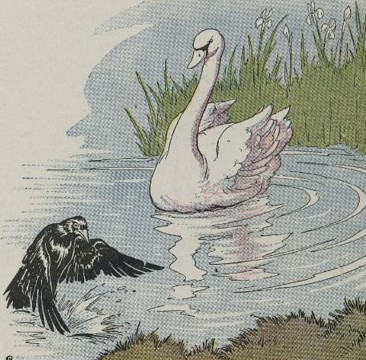| 1. feat | /feet/ |
| -an act that shows skill, strength, or bravery | |
| Healing the sick is a doctor’s feat. | |
| 2. prove | /proov/ |
| -to show that you are good at something | |
| The athletes proved that they were extraordinary at their craft. | |
| 3. witness | /WIT-nis/ |
| -a person who sees an event happening, especially a crime or an accident | |
| She is a witness to the president’s loyalty. | |
| 4. suppose | /suh-POHZ/ |
| -used at the beginning of a sentence or clause to mean ‘what would happen if’ | |
| Suppose we miss the flight, what will we do then? | |
| 5. leap | /leep/ |
| -a large jump or sudden movement, usually from one place to another | |
| The dancers stomp and leap while waving pieces of cloth and jingling bells. |
One of the feats he told about was a leap he had made in a city called Rhodes. “That leap was so great,” he said, “that no other man could leap anywhere near the distance.” A great many persons in Rhodes had seen him do it and would prove that what he told was true.
“No need of witnesses,” said one of the hearers. “Suppose this city is Rhodes. Now show us how far you can jump.”
Deeds count, not boasting words.
| 1. | What feat did the man boast to the hearers? |
| 2. | How did the man wish to prove that he was telling the truth? |
| 3. | What did the hearers ask the man to do after telling his feat? |
| 1. | What is your understanding of the fable’s lesson? |
| 2. | What do you think did the man do after the hearers asked him to prove his feat? |
| 3. | How do you keep yourself humble despite your achievements? |
| 4. | In your opinion, is it okay to boast sometimes? Why or why not? |
| 5. | Cite and explain a situation similar to the fable’s lesson. |
| Grammar 文法 |
Pronunciation 発音 | Vocabulary 単語 |
Comprehension 理解 |
|
|---|---|---|---|---|
 GOOD GOOD |
文法の誤りはほとんどなく、完全な文章で話すことができる | ほとんどの単語をはっきりと正しく発音することができる | 習った表現を適切に使うことができる | 文章を理解し、質問に正しく答えることができる |
 FAIR |
文法の誤りはあるが、完全な文章で話すことができる | 発音の練習が必要な言葉がいくつかある | たまにミスはあるが、習った表現を適切に使うことができる | 文章を完全に理解するのは難しく、質問に正しく答えられないときもある |
 POOR |
文章で話すのは難しく、単語だけで話すことができる | 発音の練習が必要である | 習った単語と表現を少しだけ使うことができる | 文章を理解するのは難しく、質問に答えるのは難しい |
An eBook from The Project Gutenberg.
This eBook is for the use of anyone anywhere at no cost and with almost no restrictions whatsoever. You may copy it, give it away or re-use it under the terms of the Project Gutenberg License included with this eBook or online at www.gutenberg.org







